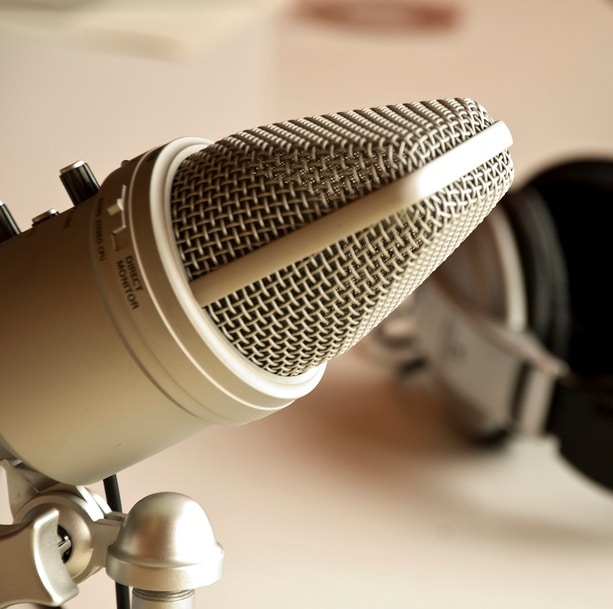The dawn of podcasts (the digital medium of episodic audio-recordings that can be downloaded or streamed online) circa 2004, ushered in a new era of independently owned and produced media. Podcasts, a mash-up between the words “broadcast” and “pod,” of iPod fame, have become a popular platform for marginalized voices.
Essentially only requiring a recording device, an Internet connection and a podcast hosting website, podcasts are relatively inexpensive and easy to produce, allowing content creators to produce episodes regularly and frequently.
During the first half of the 20th century, radio broadcasting functioned as the foremost medium for delivering relevant news, music, public affairs, and current events to largely Black audiences. Black radio also played an important role in the development of disc jockeys with powerful on-air personalities that strongly influenced musical tastes and provided discourse and commentary on current events, such as the Civil Rights Movement.
However, with payola scandals and increased corporate sponsorship came increased censorship, standardized scheduling, pressure for ratings, and less focus on issues of concern to the audiences the radio stations were catering to.
In the Internet and smartphone age, podcasts have become a reclamation of radio broadcasting, opening the door for those who typically have been shut out from producing radio shows where they do not have the backing of corporate sponsorships, access to stations, experience and training, or resources for broadcasting equipment. Many local, community-run organizations, such as PhillyCam in Philadelphia, teach workshops on how to produce podcasts, or provide shared broadcasting space, community radio stations and other resources.
Podcasting opens up the space for important cross-generational conversations, as youth and older generations alike can produce, or tune in to podcast and internet radio shows with the click of a button.
During many shows, the hosts will live tweet, take calls, or open a chat room to broaden the discussion across various platforms. In this way, podcasts deepen the connections and conversations that take place through the Internet, expanding them out in ways that a character-limited textbox cannot always capture.
The audio encapsulated on podcasts, easily archived and shareable, digitizes the oral traditions of our ancestors, allowing us to honor these traditions and tell our stories in ways that gel with our 21st century realities and technologies.
A look at the podcast scene reveals that self-described Black nerds are very active in producing all types of Internet radio shows, and in doing so, are helping to shift the image of the typical nerd to a more realistic view – that no one color, creed, culture, or gender dominates nerd culture.
Podcasts also expand cultural safe spaces for Black nerds who can express themselves directly and personally with other like-minded Black nerds. Below is a list of 9 podcasts and Internet radio shows catering to Black fandom, nerd/geek culture, pop culture, sci-fi, tech, comics, horror, and more.
What are your favorite Black alternative or nerd culture podcasts?
1. Black Girl Nerds
Black Girl Nerds is a place for women of color with various eccentricities to express themselves freely and embrace who they are, in a world where the concept of Black women as geeky-dorky beings is considered an anomaly.
The BGN Podcast broadcasts weekly and is available for download on iTunes.
2. Black Tribbles
The 2014 winners of the Philly Geek Awards for Streaming Media Project, the Black Tribbles toss around sci-fi, comic books, movies, video games, cartoons and anything a geek would love, twice weekly on G-town Radio.com and 900AM WURD.
The Black Tribbles reveal untold stories of geek history, showcase new and upcoming projects, engage in thought-provoking conversation and provide critical insight into a culture that is often devoid of Black influence; all with a humorous irreverent tone that delights as it educates.
3. Black Girls Talking
A pop-culture podcast with four Black women discussing representation of people of color in various forms of media.
4. Black Science Fiction Society
A community that highlights, celebrates and develops science fiction, speculative fiction, fantasy, horror, movies and games. Every Friday evening, BSFS hosts Genesis Radio with sci-fi author William Hyashi and Penelope Flynne.
The pair discuss relevant topics in science fiction from a Black perspective with special guest authors, illustrators, producers, and other Black sci-fi creators.
5. Blerds on Nerds
#SpreadtheNerd with Blerds on Nerds, a weekly podcast discussing the past week’s highlights in technology, movies, gaming and comics, while paying homage to Black nerds who have paved the way for us all.
6. Geek Soul Brother
Join Geek Soul Brother and The Five Nerdy Venoms in a conversation about the geek universe, including movies, television, comics and special topics, from the old school to the new geeky stuff coming out soon.
7. 3 Black Geeks
Three Black guys reppin’ all geeks everywhere, reviewing the best Black movies, martial arts, action, anime/manga, comics, and everything that white people think Black people aren’t into.
8. Fan Bros
The voice of the urban geek, Fan Bros discusses the week in geek while keeping an ear to the street for the topics and controversies that affect the world of fandom.
Show hosts DJ BenHaMeen and Tatiana King-Jones serve as the cultural guides for this unique show, along with a revolving cast of guests that run the gamut of interests – -from hip-hop and politics, to comics, movies, television and video games.
9. The Black Geeks Radio
A bunch of Black geeks get together and chaos ensues as they discuss movies, television, comics, technology, video games, and all things geek.
Rasheedah Phillips is a Philadelphia public interest attorney, speculative fiction writer, the creator of The AfroFuturist Affair, and a founding member of Metropolarity.net. She recently independently published her first speculative fiction collection, “Recurrence Plot (and Other Time Travel Tales).”

